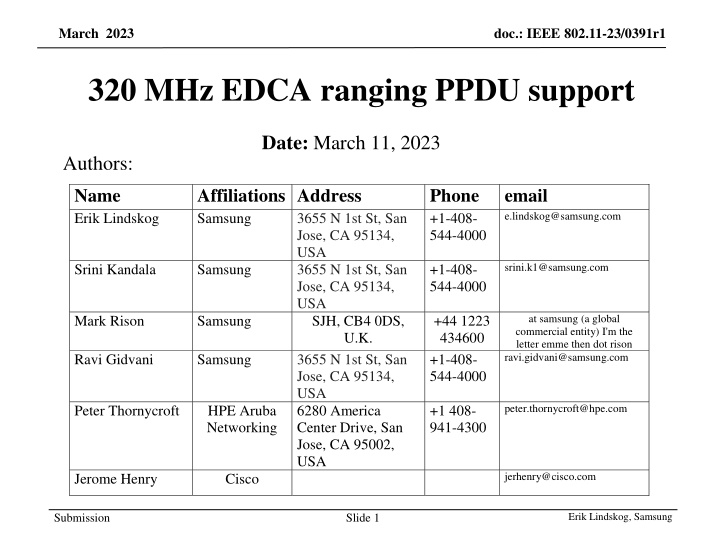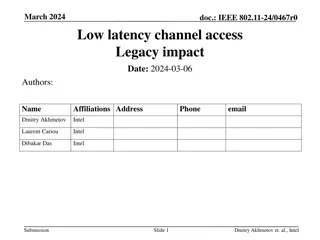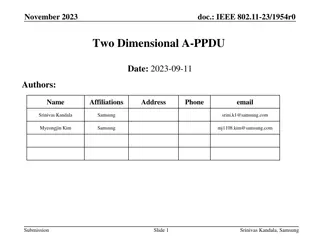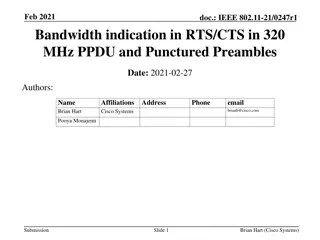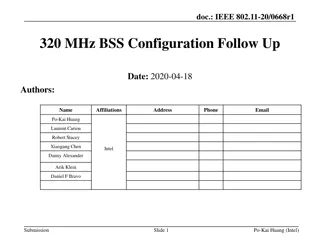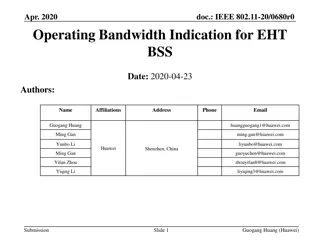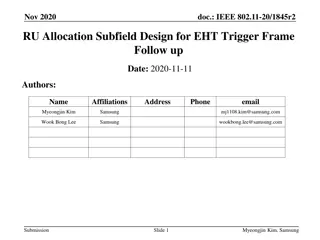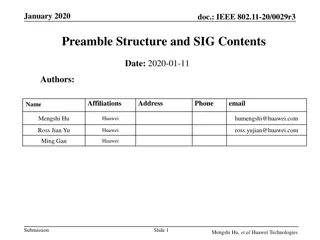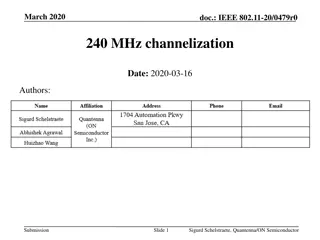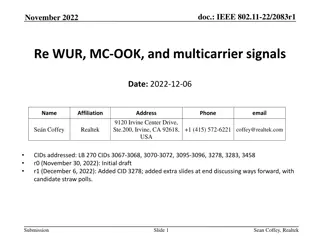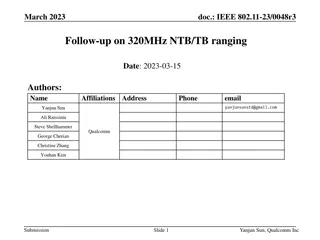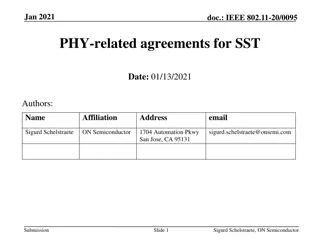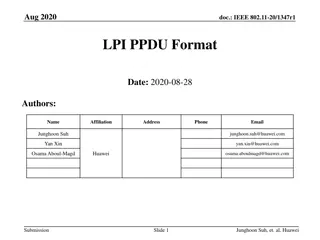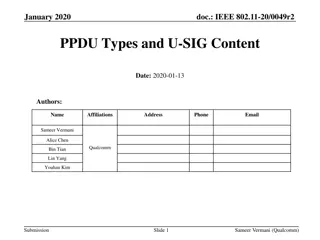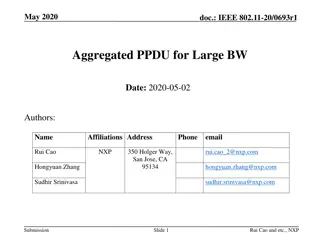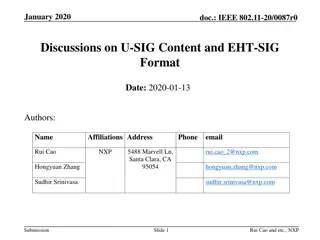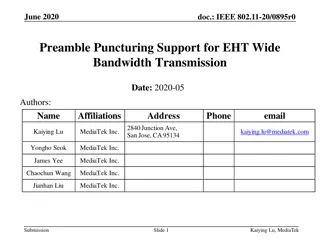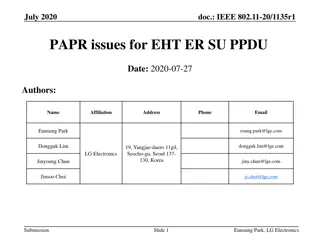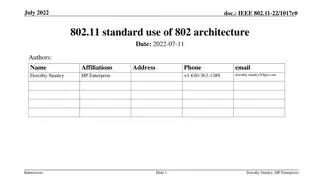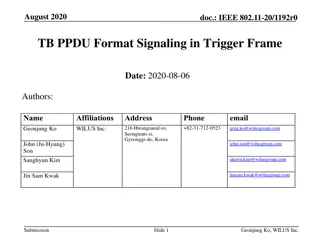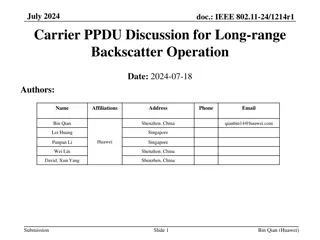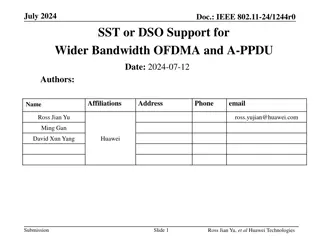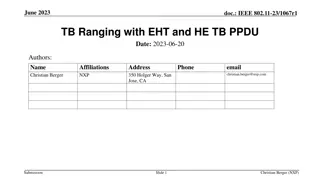Proposal for EHT 320 MHz PPDU Support in EDCA Ranging for IEEE 802.11-23/0391r1
The document outlines a proposal to enable EHT 320 MHz PPDU support for EDCA ranging in IEEE 802.11-23/0391r1. It discusses the implementation of FTM legacy ranging, the importance of wider bandwidths, and the necessary changes in the standard to incorporate this support. The proposal aims to enhance range measurements and transition to non-TB and TB ranging protocols in the future.
Download Presentation

Please find below an Image/Link to download the presentation.
The content on the website is provided AS IS for your information and personal use only. It may not be sold, licensed, or shared on other websites without obtaining consent from the author.If you encounter any issues during the download, it is possible that the publisher has removed the file from their server.
You are allowed to download the files provided on this website for personal or commercial use, subject to the condition that they are used lawfully. All files are the property of their respective owners.
The content on the website is provided AS IS for your information and personal use only. It may not be sold, licensed, or shared on other websites without obtaining consent from the author.
E N D
Presentation Transcript
March 2023 doc.: IEEE 802.11-23/0391r1 320 MHz EDCA ranging PPDU support Date: March 11, 2023 Authors: Name Erik Lindskog Affiliations Address Samsung Phone +1-408- 544-4000 email e.lindskog@samsung.com 3655 N 1st St, San Jose, CA 95134, USA 3655 N 1st St, San Jose, CA 95134, USA SJH, CB4 0DS, U.K. 3655 N 1st St, San Jose, CA 95134, USA 6280 America Center Drive, San Jose, CA 95002, USA srini.k1@samsung.com Srini Kandala Samsung +1-408- 544-4000 at samsung (a global commercial entity) I'm the letter emme then dot rison ravi.gidvani@samsung.com Mark Rison Samsung +44 1223 434600 +1-408- 544-4000 Ravi Gidvani Samsung peter.thornycroft@hpe.com Peter Thornycroft HPE Aruba Networking +1 408- 941-4300 jerhenry@cisco.com Jerome Henry Cisco Erik Lindskog, Samsung Submission Slide 1
March 2023 doc.: IEEE 802.11-23/0391r1 320 MHz EDCA Ranging PPDU Support (1) FTM legacy ranging, a.k.a. EDCA ranging in 802.11az, is currently the most implemented and deployed Wi-Fi time- of-flight ranging method. The non-TB and TB 802.11az style ranging protocols are only beginning to be implemented with no market presence to date. In the long run we would like to transition to the non-TB and TB 802.11az ranging protocols but for the time being many devices will only be supporting EDCA ranging. Thus, just as for non-TB and TB ranging, support for EDCA ranging at wider bandwidths is important to achieve sub meter range measurements reliably. Erik Lindskog, Samsung Submission Slide 2
March 2023 doc.: IEEE 802.11-23/0391r1 320 MHz EDCA Ranging PPDU Support (2) Non-TB and TB ranging requires many more HW and FW changes than ECDA ranging and therefore takes longer time to realize in the market. As such, it makes sense to enable the same wider bandwidths in EDCA ranging that we aim to realize in 11bk. We therefore propose to enable the EHT 320 MHz PPDUs for EDCA ranging as part of 11bk. Erik Lindskog, Samsung Submission Slide 3
March 2023 doc.: IEEE 802.11-23/0391r1 Enabling 320 MHz EHT PPDU support The changes needed in the standard to enable EHT PPDUs for EDCA ranging are small. Mainly we need to add one or more rows to Table 9-320 (Format and Bandwidth subfield). This would include one or more rows for the 320 MHz EHT PPDU(s). Any extra rows are those that might be needed to support split bandwidths and/or multiple LO options. Erik Lindskog, Samsung Submission Slide 4
March 2023 doc.: IEEE 802.11-23/0391r1 Straw Poll Do you support adding support for 320 MHz ranging using the EHT PPDUs to EDCA ranging? Y/N/A: Erik Lindskog, Samsung Submission Slide 5
March 2023 doc.: IEEE 802.11-23/0391r1 Thank You! Submission Slide 6 Erik Lindskog, Samsung
